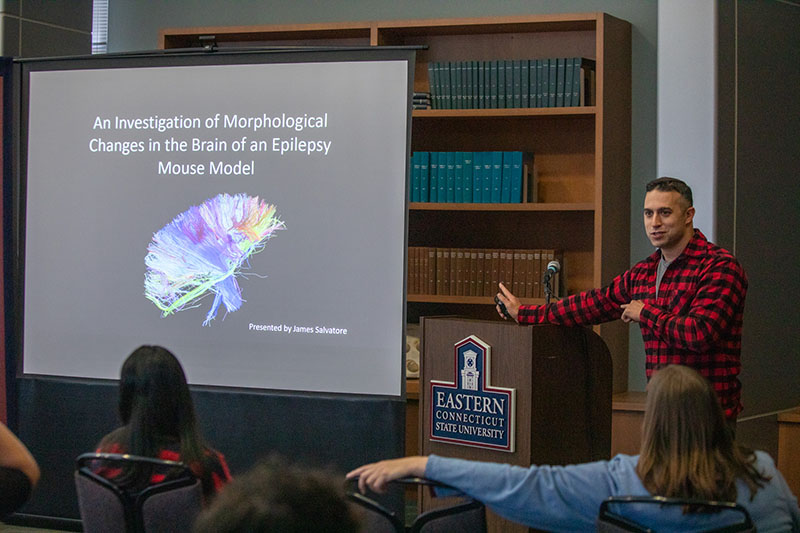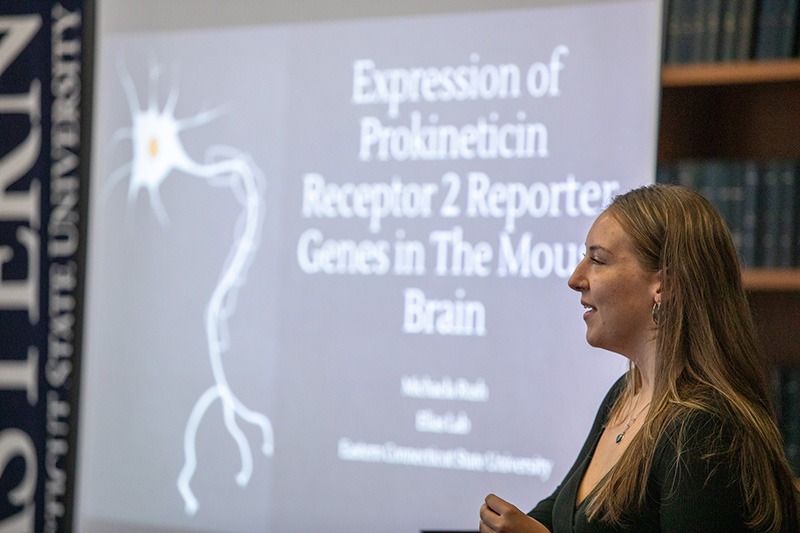- Apply
- Visit
- Request Info
- Give
Biology students prep for grad school with summer research
Written by Elisabeth Craig
Published on September 27, 2023
Three biology students at Eastern Connecticut State University presented their summer research to peers and faculty on Sept. 22, describing projects that ranged from studying epilepsy in mice to soil studies that are used by the FBI to solve crimes. All three are making plans to continue their studies in graduate school.
Senior James Salvatore’s project was titled "An investigation of morphological changes in the brain of an epilepsy mouse model.” Salvatore shared his overall experience in a research facility while simultaneously elaborating on his specific project. He acquired his position through the Research Experiences for Undergrads (REU) program.
“It really helped me build confidence and form connections,” said Salvatore. “Plus, it looks good on a resume.”
Salvatore researched epilepsy by using four components from an epileptic mouse’s brain to identify cell effects. “Nobody knows exactly how it’s happening, but luckily through research I can give a basic rundown.”
His future plans include more internships, and he is currently applying to graduate school at the University of Connecticut. He is interested in researching cell density.
Junior Nancy Avalos’s presentation was titled "Analysis of Soil Microbiomes using 16S rRNA gene DNA Sequencing.” Avalos had an online summer internship with the University of Arizona, where she plans to go to graduate school.
“Dr. Kelly Elkins (her faculty supervisor at UA) provided lots of data,” said Avalos. “Lots of their students want to go into the FBI because they use a lot of this science to solve crimes, such as investigating murders.”
Her experimenting focused heavily on hypothesis testing on soil samples from different areas. Her research also consisted of a lot of data analysis on the samples. She drew back on her FBI example, noting that data processing is incredibly meticulous when investigating violent crimes.
“One wrong move and they could get the wrong suspect,” said Avalos.
She also explained the versatility of the analytical techniques she used. “This kind of research can be used outside the forensic field,” said Avalos. “I didn’t have much time to get into this during my internship, but these techniques can be used to analyze cancer cells, for example.”
Senior biology major Michaela Rush‘s presentation was on “The Expression of Prokineticin Receptor 2 Reporter Genes in The Mouse Brain.” Rush is considering applying to Michigan State University, where she did her research project. “I don’t have a background in neuroscience,” said Rush, “but I had a very gracious supervisor. No one expects you to go in knowing exactly what to do.”
Her research analyzed Kallman syndrome and how a lack of neurons causes infertility. She analyzed the organs and brain X-rays of lab mice affected by this. “I knew it was bad when I was experimenting, and the mouse’s insides were completely red,” said Rush, commenting on the difficulty of analyzing the project.
Regardless of the difficulty of the project, Rush said that the experience was an enlightening one. “It was an amazing experience for me to be out there and I’m so glad I had this opportunity.”





